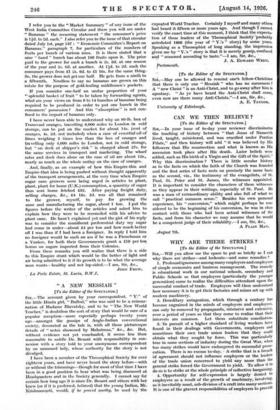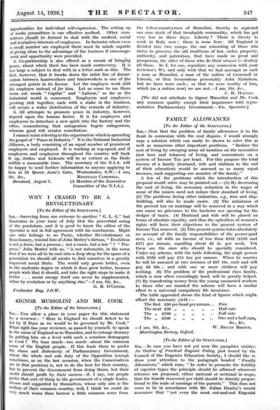WHY ARE THERE STRIKES ?
[To the Editor of the SPECTATOR.]
SIR,—Will you allow me the space to put as briefly as I can why there are strikes—and lockouts—and some remedies ?
1. Profound ignorance among many employers and employees of simple economics and business management. The remedy is educational work in our national schools, secondary and Public Schools so that employees (particularly the younger generation) came to realize the difficulties attendant upon the successful conduct of trade. Employers will then understand how necessary it is to get their factories and mines set up with modern machinery.
2. Hereditary antagonism, which through a century has become engrained in the minds of employers and employees, can only be removed by propaganda, intensive and extensive, over a period of years so that they come to realize that their interests are common. Let them substitute conciliation.
3;-In pursuit of a higher standard of living workers have fourid in their dealings with Governments, employers and sometimes their own trade union leaders that they could Obtain -what they sought• by force. This was particularly true in some sections of industry during the Great War, when too many strikes would have endangered its successful prose. cution. There is no excuse to-day. A strike that is a breach of agreement should not influence employers 'or the -leaders of the trade union concerned to yield any more than the general strike forced the Government to yield- To allow it to do so is to strike at the whole principle of collective bargaining.
4. Opportunity for self-expression is largely denied W employees as a result of the growth of machinery, involving, as it inevitably must, sub-division of a craft into manysections: It is one of the gravest responsibilities of employers to provide
opportunities for, individual self-expression. The setting up of works ,flommittees is one effective method. Other com- mittees cohpuld be formed to deal with the medical, social and recreative interests of employees. In factories where even a small number are employed there must be minds capable of, giving ideas to the advantage of the business if encourage- ment and opportunity were provided. 5. Co•partnelship. is also offered as a means of bringing peace, about which there has been much controversy. It is too large a subject to deal with in a letter such as this. The fact, however, that it breaks down the strict line of demar- cation between handworkers and brainworkers is one of the strongest points in its favour. Let the employee work wUh his employer instead of for him. Let us cease to use those worn out words " Capital" and " Labour," so far as the industrial world is concerned. Employers and employees growing rich together; each with a stake in the business, will secure a wider distribution of the rewards of industry.
6. All attempts to promote peace in industry, however, depend upon the human factor. It is for employers and employees to introduce a new spirit into the factory and the office, remembering that antagonism begets antagonism, whereas good will creates conciliation.
I cannot resist referring to the organization which is spreading the gospel of " Peace in Industry." It is the National Industrial Alliance, a' body consisting of an equal number of prominent employers and employed. It is working at top-speed, and if employers and employees throughout the country will back it' up; strikes and lockouts will be as extinct as the Dodo within a measurable time. The secretary of the N.I.A. will be happy to send further information to anyone applying to him at 25 Queen Anne's Gate, Westminster, S.W.—I am,
Banstead, August 7. (A Member of the Executive
Committee of the N.I.A.).



































 Previous page
Previous page